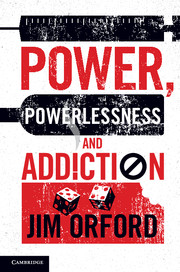Book contents
- Frontmatter
- Dedication
- Contents
- Preface
- Acknowledgements
- 1 Powerful connections
- 2 How addiction erodes free agency
- 3 Addiction subordinates the interests of family members and friends
- 4 Inequality in the power to resist addiction
- 5 Power and powerlessness in the addiction supply industries
- 6 Reasserting control and power in the process of change and treatment
- 7 Facing up to the power of addiction and those who benefit from it
- References
- Index
6 - Reasserting control and power in the process of change and treatment
Published online by Cambridge University Press: 05 July 2013
- Frontmatter
- Dedication
- Contents
- Preface
- Acknowledgements
- 1 Powerful connections
- 2 How addiction erodes free agency
- 3 Addiction subordinates the interests of family members and friends
- 4 Inequality in the power to resist addiction
- 5 Power and powerlessness in the addiction supply industries
- 6 Reasserting control and power in the process of change and treatment
- 7 Facing up to the power of addiction and those who benefit from it
- References
- Index
Summary
Up against the diminution of personal agency which addiction entails, backed up by the power of those who benefit from the supply of the addictive substance or activity, it is a remarkable fact that every year people in their tens and hundreds of thousands overcome their addictions. How is control reasserted, power re-established? Where does the motivation to change come from? On the face of it there appear to be two contradictory opinions about this. First, there is the view that change must come from the individual; it has to be a question of self-determination. In fact, that is probably the view about conquering addiction which holds sway in the public imagination: no one except the addicted person him- or herself can do it. In some ways that view is very convenient for the rest of us; it's his or her problem not ours. It is also the position on the question of addiction change espoused by many professionals and to be found in many academic accounts of how people give up addiction. The most prevalent theory is a cognitive one: people make changes because they start to think differently about drink, drugs or gambling and the roles they play in their lives. This was the view that impressed me most when I was preparing my book Excessive Appetites (Orford 2001). I formed the view, as many others have done, that making a change to one's addictive behaviour was, in most important respects, just like making any other life decision, albeit in this case a particularly difficult decision. Others have written about, ‘weighing the perceived costs and benefits of continuing to drink and deciding that the adverse consequences outweigh the benefits’ (Sobell et al. 1993, p. 222). It is like carrying out a private cost–benefit analysis. Others have talked of addiction change in similar terms, using expressions such as ‘resolving’, ‘appraisal’, ‘contemplation of change’, ‘commitment to change’ or ‘breaking down denial’ (Janis and Mann 1977; DiClemente and Prochaska 1982).
Information
- Type
- Chapter
- Information
- Power, Powerlessness and Addiction , pp. 170 - 192Publisher: Cambridge University PressPrint publication year: 2013
